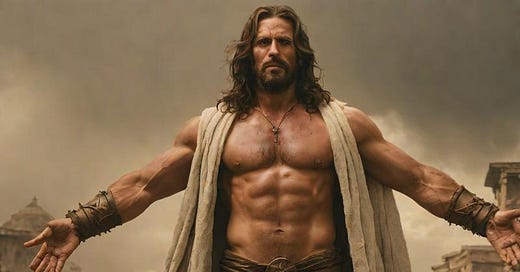EXCLUSIVE ESSAY: A Vitalist Christianity? Don't Bet On It
Read my Meditation essay from the first fully physical issue of MAN'S WORLD, which is now available for preorder from Passage Publishing
Here’s an exclusive look at my Meditation essay for the next issue of MAN’S WORLD, which will be released in April and is available to preorder now from Passage Publishing.
This essay is about the dissident right’s problem with Christianity. Basically, I think most writers on the dissident right misunderstand Christianity and treat it in simplistic terms, whether they’re trying to argue that Christianity is a barrier to Western renewal or that Christianity, in some “vitalist” form, is the solution.
As always, I’m interested to read your thoughts on the piece, so please let me know what you think in the comments section below.
It’s impossible to think about the future of Western civilisation without thinking about Christianity. Even now, whatever the present state of Christianity in all its various shapes and rainbow colours, there’s no escaping its continuing influence on every aspect of Western life and thought. If Westerners we be, then Christians we be too. It’s that simple.
The Western tradition is Christianity. Some try to deny this, but they’re wrong. Even if you just want to get rid of Christianity and start all over again, by reconnecting with what you consider to be the West’s pagan roots, you’ll have to go through Christianity to do it. Your opposition to Christianity ties you to it, and it to you.
Our access to the Classical World, and to European paganism of the ancient world more broadly —inasmuch as we can know anything about it — is mediated by Christianity. For a thousand years, Christianity guarded vital aspects of the pagan past and carried them forward, not least of all by preserving much of the institutional structure and the imperial aspirations of the Roman Empire. Christianity preserved the language and learning of the Classical World too; although much was also lost.
T.S. Eliot was right when he said, in The Idea of a Christian Society, that the West would only cease to be Christian when a different positive ideology took its place. By “positive” he meant of course a substantive set of doctrines and beliefs, a worldview that actually has some meaningful content of its own, rather than being just a series of negations and denials. It’s not enough just to say “I don’t go to Church and I don’t believe, so I’m not a Christian.” The air we breathe and the very earth we walk on are Christian.
The great fragmentation of Christendom that began with the Reformation and culminated in the Enlightenment, secularism and the “Death of God” did little to remove Christianity from the West. If anything, Christianity became insinuated more deeply in Western life, in new forms that could command just as much fervour as the old, perhaps more.
The dominant supposedly secular mass belief-systems of our day, liberalism and the various forms of socialism, including Marxism, are nothing but outgrowths or bastard children of Christianity. They are what T.E. Hulme called “spilt religion”, in which fundamental aspects of religion, like its moral system or its vision of human nature or even its path to salvation, spill over from the vessel they were once contained in, creating a real bloody mess — in Hulme’s memorable image, like a pot of treacle being poured all over the dinner table.
Neither liberalism nor communism would be possible without the universalism and absolutist moralism of Christianity. The great socialist utopias are so obviously inverted heavens, where paradise is made possible in the here and now rather than the after, that it should really go without saying.
I attach these thoughts as a preface to the main purpose of this piece, which is simply to say that the dissident right has a problem with Christianity. Instead of treating Christianity with the sophisticated analysis it deserves, considering not only the complex problems raised by Christian theology but also the history of the Church as it has actually existed, we get cheap caricatures. These distortions serve to do little more, in the end, than make the dissident right look unlettered — actually, “stupid” is a better word — and alienate potential allies in the coming fight for the future of the West. Here are two examples.
Keep reading with a 7-day free trial
Subscribe to In the Raw to keep reading this post and get 7 days of free access to the full post archives.





